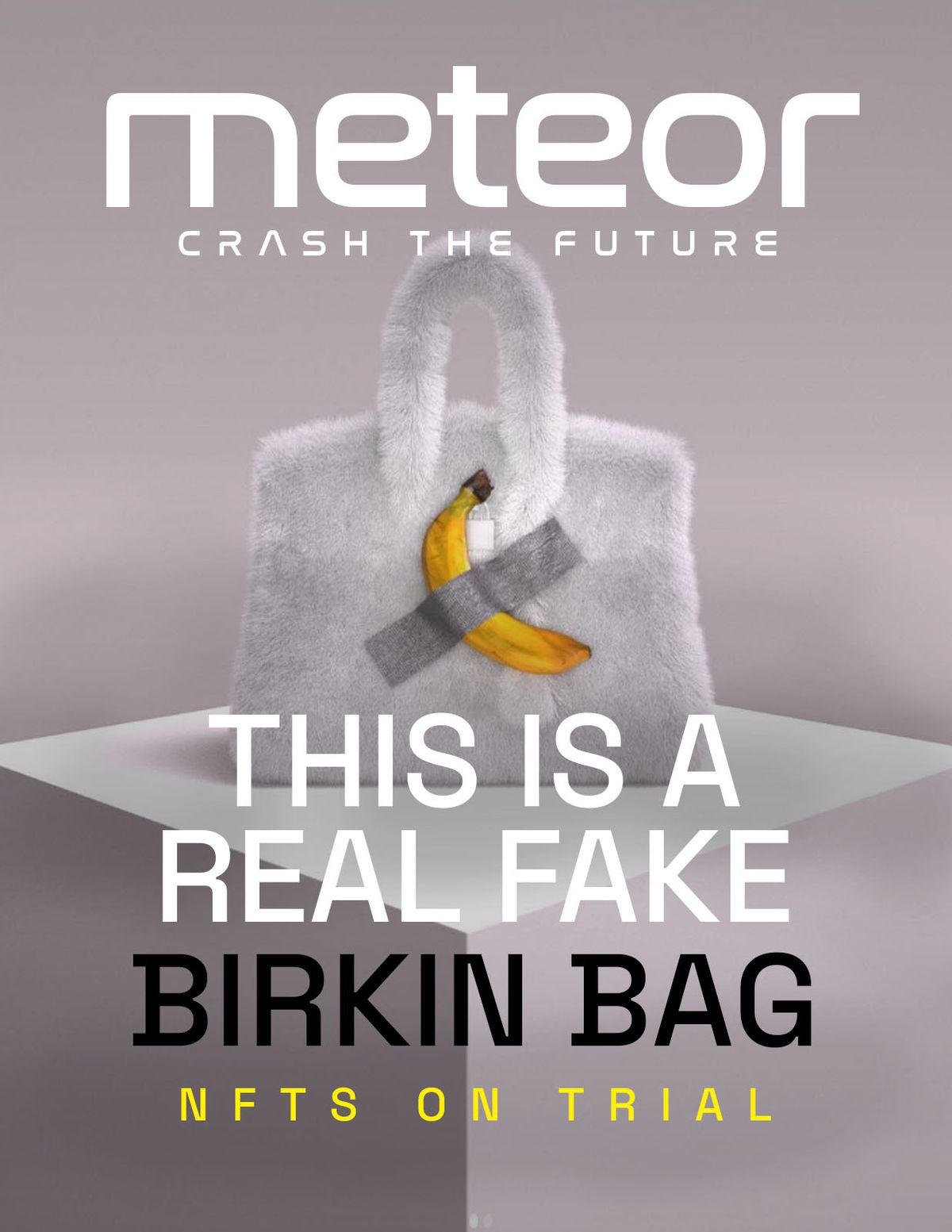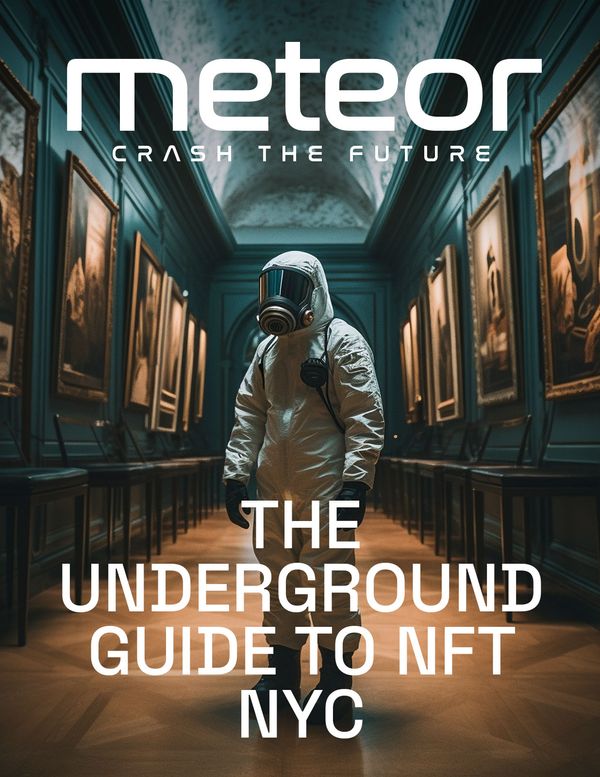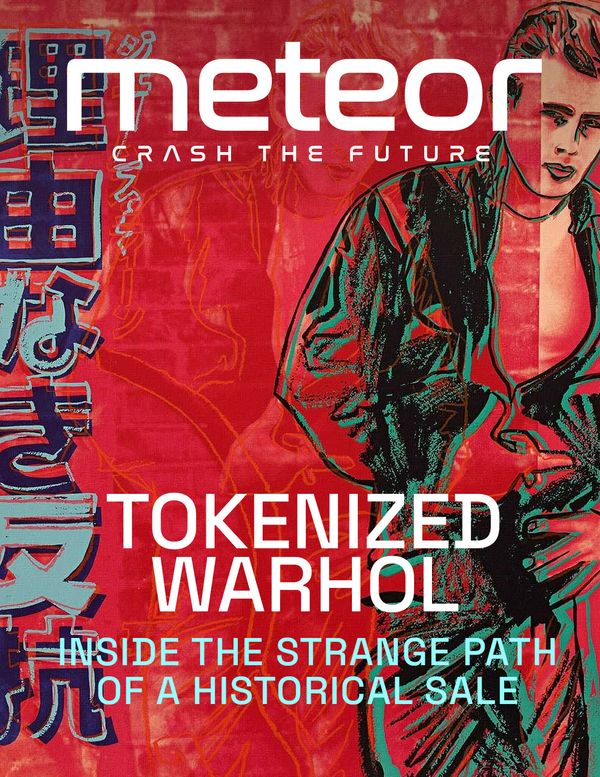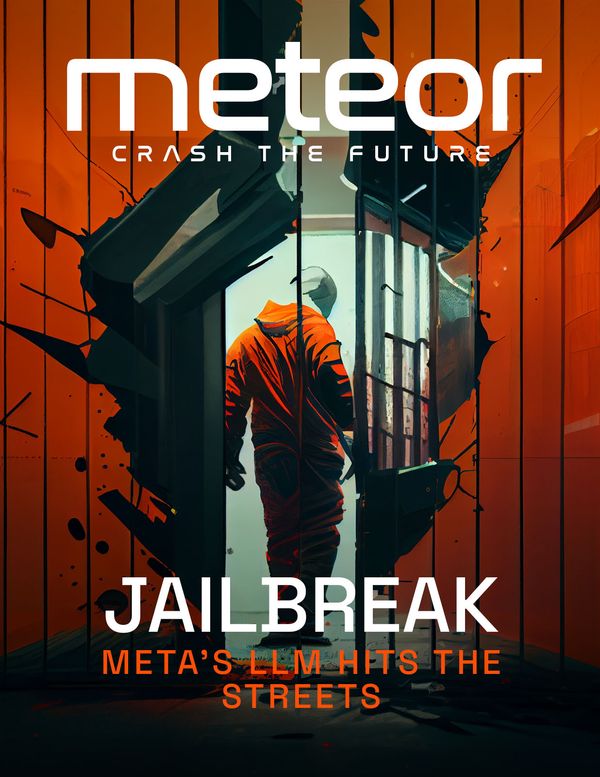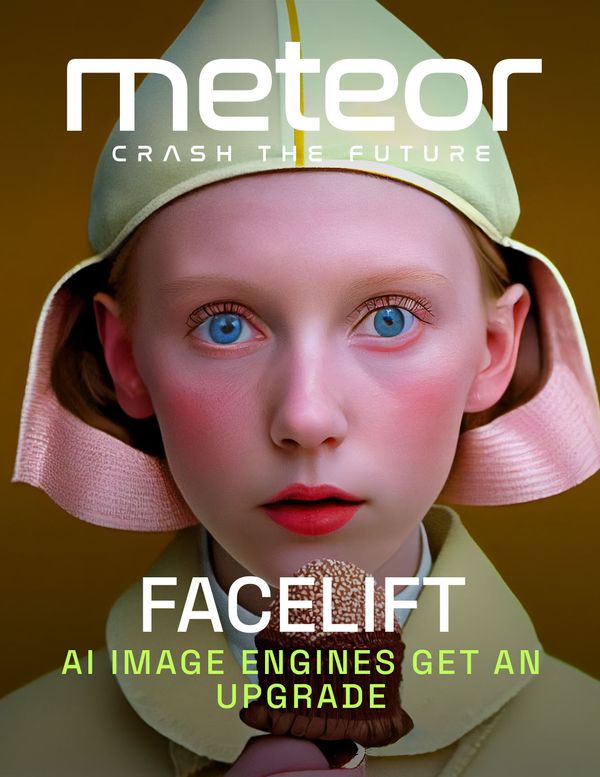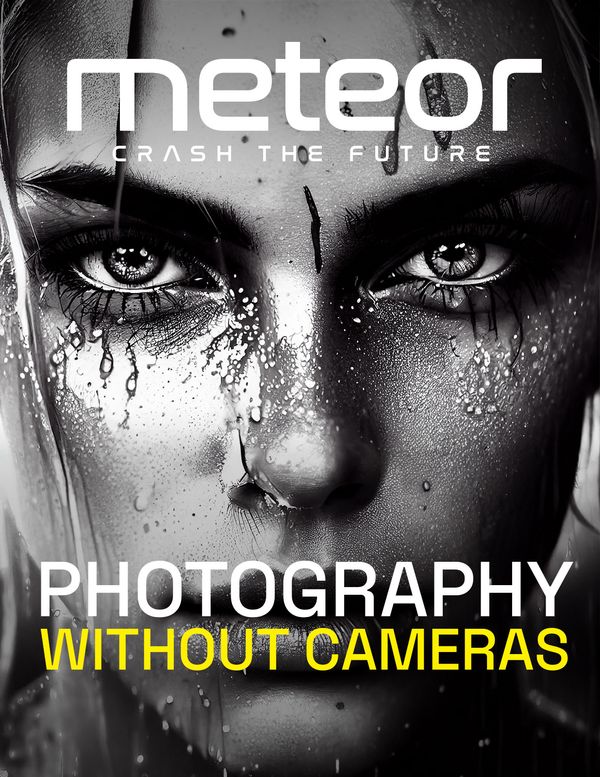Inside Today's Meteor
- Create: The Infinite Loops of Carlos Marcial Torres
- Think: Art of the steal with Hermes, Yuga and Nike NFT trials
- Compress: Your new teammate is a robot
- Disrupt: The Web3 startup that wants to doxx your crypto wallet
"I think there's a pretty good argument that [Yugalabs] no longer own the copyright and that their holders own the copyright. So I think that's why they didn't sue on copyright infringement and took a trademark stance there. The issue there is not copying. It's confusion, and it allows Ryder Ripps to come in and say, "Look, no one's really confused. This is a commentary and everybody knows it."
– NYU Law Prof. Michael Kasdan, on Yuglabs v Ripps
Create
The Infinite Loops of Carlos Marcial Torres

In 2017, a massive earthquake rocked Mexico City taking 228 lives. Carlos Marcial Torres believes he could have been one of them. “I was with my wife that morning. I stalled leaving the house. Something kept pulling me back. I didn't want to leave.”
At the time, Torres was teaching film and VFX at the Tecnologico de Monterrey, where a building collapsed and several died.
After the earthquake, Torres lost his job. My wife said, “You have to do something. We have to eat. If you don’t find something in Mexico, find places around the world.”
He soon landed work as an art director in a blockchain company in Shanghai, China, making smart use of his skills as a 3D designer. That led to creating his own design studio to service blockchain companies. “My salary was being paid in bitcoin,” he says. “Nobody wanted bitcoin because it crashed, but I understood where it was going.”
Torres taught himself about NFTs and found SuperRare on Twitter. “I was getting so passionate about bitcoin and blockchain and of course my first passion is art,” he says. “It was the first time I saw my two passions collide.”
Today, Torres' work is highly sought after by NFT collectors. He mixes references to blockchain ideologies and internet memes with magic realism, an artist style that merges reality with magical or fantastical elements. Much of his work plays on infinite loops, creating a Twilight zone sensation in the viewer.
In this work, "Blockchain is the Message," his first tokenized video, "he animates the succession of connected rooms as a metaphor for the blocks that make up any blockchain," says the founder of MakerPlace, the digital gallery that auctioned the work in 2020.

Find more of Torres' work on Twitter and SuperRare.
-- Written by Neil Katz (Meteor CEO).
Think

tl;dr
- Hermes, Yugalabs and Nike battle NFT knockoffs in court
- Brands claim the projects are money making schemes that confuse consumers
- Defendants cry artistic expression and first amendment
- The cases center on trademark, not copyright
- Legal experts say there are big implications for both artistic expression and the power of brands in the new NFT marketplace
- $85M shocker: Yugalabs might have accidentally given their copyrights to Ape holders
You can hear the full audio here (discussion begins around 7:30) and read the raw transcript here.
Evan Hansen: New York artist Mason Rothschild is in the hot seat. He took some Birkin bags, covered them in fake fur and said this is art, so far so good. But then he minted them as non-fungible tokens and sold them online [as "MetaBirkins"] for a million dollars. That got the attention of Hermes which makes those bags and they say hey that's our brand that's our money and Rothschild says suck it and they wind up in court.
Michael Kasdan: Yeah I think that's essentially right. This is particularly interesting because you have this kind of emerging new space of NFTs and Metaverse where I think it's a little more difficult for folks to get their arms or brains around what exactly is the product and s it just a piece of art for which you have first amendment protections and artists can lean on those. Or is it a product that creates confusion with the brand?

EH: This is a trademark case, not a copyright case. And what are the issues there? Because we've seen a lot of remixing culture. This goes back for years in the music business. But trademarks you don't see as often in this space.
BK: So this one, the Hermes v. MetaBirkin's case, the Yugalabs v. Ryder Ripps case, the Nike v StockX case, they're all trademark cases. Trademarks can be a name like Hermes or Birkin or it can be a symbol like the Nike swoosh. And so the issue with a trademark is the confusion between the brand owner and the product.
The interesting question to copyright suits is when is it copyright infringement and when is it fair use, when am I transforming it and changing it? There's a case before the Supreme Court involving Andy Warhol right now on that.
But this is a trademark case because I think first of all, copyright is reserved for artistic works and the bag is a functional thing. The issue is, hey, you're using our name, Birkin, and you're maybe using our trade dress. You're selling these digital bags that are in the same shape as our Birkin bags. And so Hermes opted to bring the trademark case here.
EH: Let's talk a little bit about the Ryder Ripps case, which you've mentioned. In this case, the brand's a digital Web3 native, the Bored Ape Yacht Club, an NFT collection. It's not exactly owned by, but it's managed by Yugalabs. The Bored Ape's are collectible cartoon apes, and they went viral and commanded really enormous prices as well. But maybe even more importantly, they provide entry into a pretty exclusive Web3 community.
A guy named Ryder Ripps, he's described by many people as an Internet provocateur, made some disparaging remarks -- I'm not going to get into the details of what those were -- but it became a big controversy. And then he knocked off the Apes in his own NFT collection and he claimed it as social commentary. So [they] wound up in court, is that about right?

MK: Yeah. So they have this collection of right, 10,000 of these apes. When you buy one of those, you not only get the digital image ownership, but you get the rights to commercialize it. And it is a pretty exclusive club. Ryder Ripps basically copied them exactly and created a collection called the "Ryder Ripps Board Ape Yacht Club" and sold them for a lot of money. And yes, his explained reason for doing so was I think these guys are bad guys and then I have problems with the imagery. And this is my social commentary. But it was pretty commercialized. He made a lot of money selling that social commentary and they were exact copies.
When I first looked at it, I thought, "Okay, this is a very clear cut copyright infringement case." He made a collection of exact copies. The issue there though, reading between the lines, is when they originally minted the Bored Ape Yacht Club NFTs, they had terms of use that I think were charitably very confusing. But I think that a fair reading of those terms of use is that when you buy one of those NFTs, you actually get ownership of the copyright as a holder of the NFT.
I think there's a pretty good argument that [Yugalabs] no longer own the copyright and that their holders own the copyright. So I think that's why they didn't sue on copyright infringement and took a trademark stance there. The issue there is not copying. It's confusion, and it allows Ryder Ripps to come in and say, "Look, no one's really confused. This is a commentary and everybody knows it."
EH: I'm curious if you see that as a wider issue for the overall NFT space, of this particular nuance of, "Hey, we would have had a close case on copyright, but now we're screwed and we have to go through trademark which is a lot harder."
MK: Yeah, I think it's a really big deal. I think one of the really exciting things about NFTs is you have really complete flexibility for what you do on the IP side. You can give someone full commercialization rights like you buy this NFT and you can make a movie with it. You can write a book with it. You can license your character to a brand. All the way to the other end you get no IP rights. You just get to say that you own this piece of art and display it as if you were to buy a t-shirt with Coca-Cola on it. There's this huge flexibility. I think it's really important that you think about in your terms of service what rights you're giving, be really transparent both on the sell side and the buy side and also be thoughtful about the implications on the IP side.
I think what happened in this case was before they got lawyers and before they knew that they were going to be hugely viral they just sort of slapped together some terms of use so not really thinking about it too much. That's my speculation based on reading them. But I think it is kind of a good practice pointer to say hey, you know, really think about this.
It would have been better I think to give a very broad license to retain the kit so that as the project you can do things like we're going to protect this IP if someone knocks it off and you have standing to do that. So yeah I do think it's a pretty important practice pointer.
EH: Let's go back to the cases that we were talking about. What are the implications?
MK: I think these are these cases are a big deal and I think they're attracting a lot of attention because I think folks realize, even lay people who are not steeped into the nerdy IP issues, that it's a really kind of fundamental question as to where that line is [for] expressing myself artistically.
But just as a lawyer to keep it in perspective, it's not like it's a Supreme Court case or a circuit case. It's just kind of a first case.
Compress
ChatGPT is coming to Microsoft Teams
Fresh off its $10B investment in OpenAI, Microsoft has integrated ChatGPT into Teams, for $7/month.
Web3 startup wants to doxx your crypto wallet
This should be interesting.
2023, the year brands go big on NFTs
NFT trademark filings went up 5X last year.
As if anime artists didn't have a raw enough deal...
Here comes Netflix with the AI.
That's got to hurt
Uniswap whale a16z got frozen out of the DAO's recent community vote
ChaptGPT is the fastest startup of all time to hit 100 million users
It took Instagram 2.5 years, GPT just two months.
We wish we didn't have day jobs
Stadium is a new on-chain esports hub we would spend a lot more time on if we didn’t have a newsletter to write.
Elon needs to pay the rent
Twitter plans to cut off free API access to developers next week.
Disrupt



Thanks for reading! Please take just 30 seconds to tell us what you love or hate about this issue.

